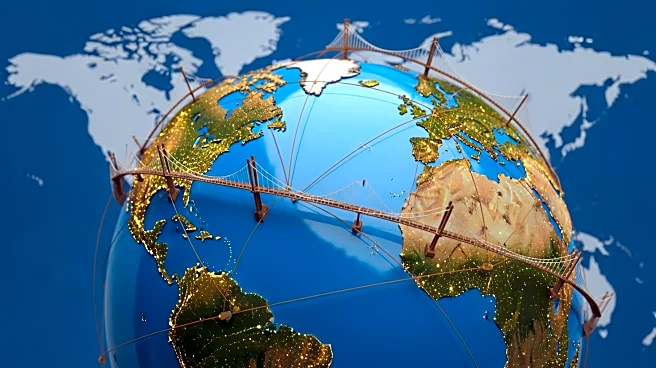What's Happening?
The BRICS New Development Bank (NDB) was established in mid-2014 by Brazil, Russia, India, China, and South Africa with an initial capital contribution of $50 billion, which can grow to $100 billion with contributions from other countries. The NDB aims
to fund infrastructure and sustainable development projects on a significant scale, addressing the massive investment gap in emerging and developing economies, estimated to reach at least $1 trillion annually. The bank provides valuable resources to help fill this gap and gives emerging and developing countries a greater voice in the development finance architecture. The NDB is part of a broader effort by BRICS leaders to create new institutions, such as the Contingency Reserve Arrangements (CRA) and the Asian Infrastructure Investment Bank (AIIB), to support development finance.
Why It's Important?
The NDB's focus on infrastructure and sustainable development is crucial for addressing the investment gap in emerging and developing economies. By providing significant funding, the bank can help these countries build essential infrastructure, which is vital for economic growth and development. The NDB's creation also represents a shift in the global development finance landscape, giving emerging economies a greater voice and reducing reliance on traditional Western-led institutions. This could lead to more balanced and inclusive development policies, benefiting a wider range of countries.
What's Next?
As the NDB continues to grow, it may expand its membership to include more countries, increasing its capital base and capacity to fund large-scale projects. The bank's focus on sustainable development may drive innovation in project implementation, setting new standards for development finance. The NDB's efforts to fill the infrastructure investment gap could lead to increased economic growth and development in emerging and developing economies, potentially influencing other multilateral development banks to adopt similar approaches.
Beyond the Headlines
The NDB's creation highlights the shifting dynamics in global development finance, with emerging economies taking a more active role in shaping the agenda. This could lead to a more balanced and inclusive international financial system, reducing reliance on traditional Western-led institutions. The bank's emphasis on sustainability and ESG impacts may also encourage other development banks to prioritize these factors, leading to more environmentally and socially responsible projects worldwide.
















